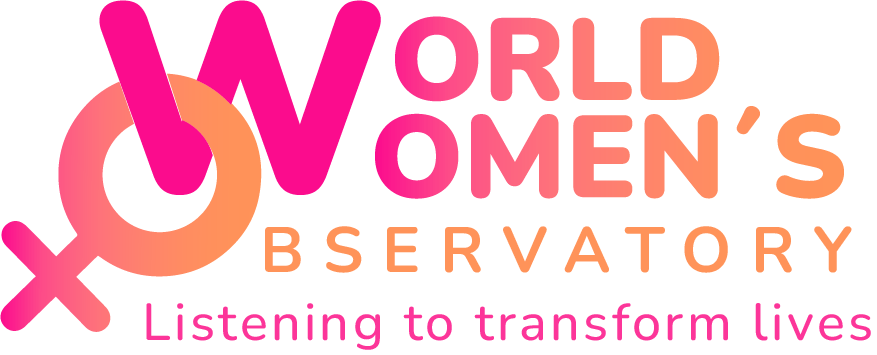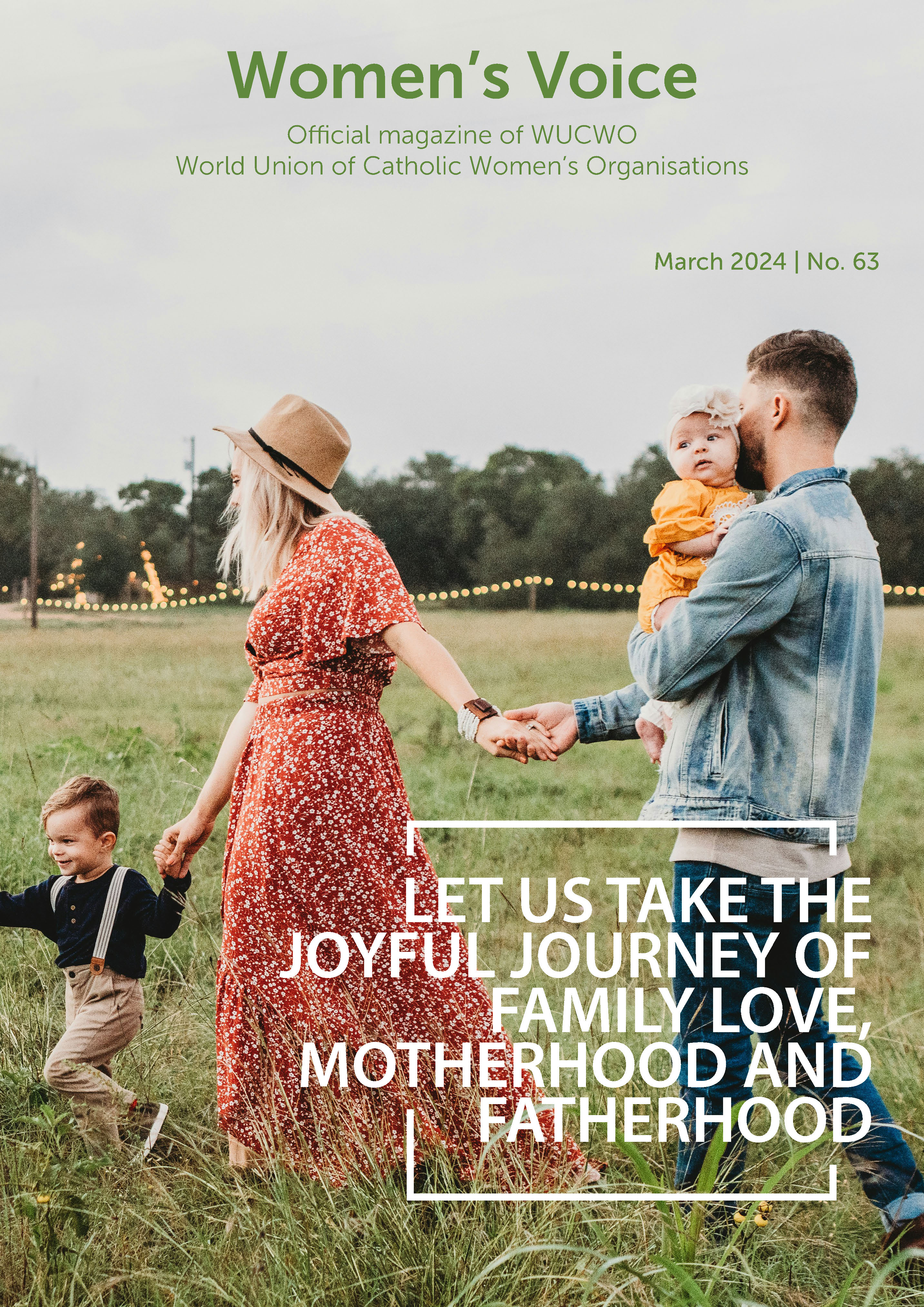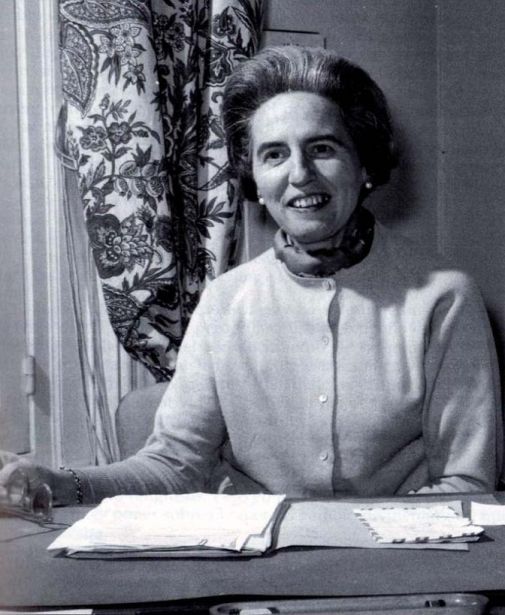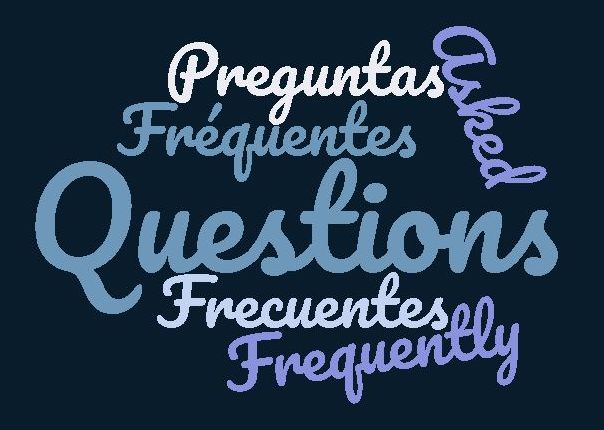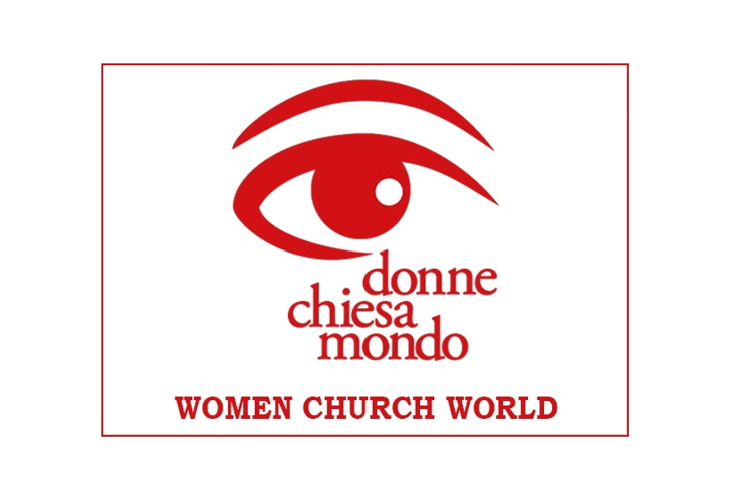+39 0669887260 | info@wucwo.org | Contact us
Resolutions 2014-2018
Family and Human Trafficking

Please find below a report by our Vice-President General, Maribeth Stewart, on human trafficking and the family.
THE FAMILY AND HUMAN TRAFFICKING
One of the resolutions adopted at the 2014 General Assembly held by the World Unions of Catholic Women’s Organisations (WUCWO) concerned support of the Family and a second resolution was devoted to fighting against Human Trafficking. The Working Group on the Family resolved to provide information concerning Human Trafficking and the Family and prepared a questionnaire that was sent to all WUCWO member organisations. Responses were received from 20 countries to include:
Africa Region: Congo, Ghana, Senegal, Swaziland, Tanzania, Zambia
Asia-Pacific Region: Australia, Fiji, Japan, Korea, New Zealand, Philippines
Europe Regions: Hungary, Malta, Spain, United Kingdom (2 responses)
Latin America: Argentina, Venezuela
North America: Canada (2 responses), United States of America
We are grateful to our member organisations for their complete and honest responses that have enabled the WUCWO Working Group on the Family to prepare this report that reflects information from around the world regarding the effect on the family of the scourge of human trafficking.
Prior to noting the specific effects of trafficking on the family, it is important to list the various forms of trafficking that can affect the family. Responses to our questionnaire indicated the following:
- Trafficking for prostitution;
- Trafficking for labor; and
- Trafficking of harvested organs.
Groups noted as subject to trafficking include:
- Children and youth from poor rural areas
- Children and youth from poor urban areas
- Runaway youth
- Women and children escaping from domestic violence situations in all social strata
- Youth who lack self-esteem and/or who perceive that they do not receive the necessary love or guidance from their family
- War zone inhabitants
- Prisoners (trafficking of harvested organs)
It may be useful to make a distinction here between human trafficking and human smuggling due to refugee situations. Some responses included human smuggling as a form of human trafficking in their answers. While it is true that human smuggling subjects many of the persons being smuggled to extortion and to terrible conditions that may result in the death of the person being smuggled, human smuggling is not considered to be human trafficking because the persons being smuggled enter into the arrangement without coercion and once they arrive at their destination, they are free. Human trafficking, on the other hand, is a situation in which one person exerts total control over another and the controlled person is not free unless they manage to escape or are rescued.
SEX INDUSTRY AND FORCED LABOR
The reality of human trafficking and its relation to prostitution and to labor is all too well known and it is not the intent of this paper to make those connections. The horror of children being sold so that the rest of the family can have food to eat, of teens running away from home only to be lured into the sex industry and becoming hooked on drugs, of refugees being forced into labor or sex industries to survive, all these stories and more should be familiar to everyone reading this report. Human trafficking is a $32 billion per year industry, second only to the sale of drugs. Organized Crime is behind most human trafficking around the world. According to the Global Slavery Index, approximately 45.8 million people are enslaved at any given time.
ORGAN HARVESTING
Perhaps a less well-known aspect of human trafficking is that of the trafficking of human organs.
It is estimated that today there are 123,000 men, women, and children waiting for an organ transplant and that of those, approximately 25 per day will die before a suitable organ becomes available. The reality is that thousands of wealthy persons will turn to the black market to procure a life-saving organ, regardless of how it is obtained.
In countries equipped to medically harvest and transplant organs, it is understood that the practice, with rare exception such as kidney donation, is confined to persons who have died and either they or their next of kin have agreed to donate the deceased’s organs that they might be used to save the life of another. In cases such as kidney donation or partial organ donation when it is safe, the donor must consent to the donation of one kidney or part of an organ after being given all the warnings that the operation entails. In all transplant cases, the donation is voluntary and accepted only after informed consent is obtained.
At least that was thought to be the norm until evidence was presented at some UN hearings and at a meeting in the Vatican that China was transplanting organs without consent from prisoners condemned to death. At first, China denied these allegations and a few years later, admitted to the practice but indicated that they were slowly ending the harvest of organs from dead prisoners. Unfortunately, this has not proved to be the case as we are learning from independent human rights watch groups, most notably the international Doctors Against Forced Organ Harvesting. Rather than slowing, it is evident that organ harvesting has grown exponentially in China with the addition of transplant hospitals and transplant units, accelerated training of transplant surgeons, and the officially reported numbers of transplant operations going from around 7,000 per year in 1998 to 100,000 in 2015. There are officially 710 organ transplant centers in China today with the Director of the Beijing Organ Transplant Institute reporting that their Center alone performs 4,000 kidney and liver transplants annually. Without question, this practice has become a huge money maker for China and enjoys state sanction. The big question is, where are all these organs coming from? Sadly, the correlation of “disappeared” arrested followers of Falun Gong, a Buddhist practice now condemned by the ruling Communist party, aligns with the increase in organ transplants. The allegation made by human watch groups, denied by the government, is that there are thousands of Falun Gong political prisoners being killed for their organs while they are imprisoned. This is corroborated by Falun Gong former prisoners who testify that they were routinely subjected to medical tests that would indicate their compatibility as organ donors. This information is also in accord with reported Chinese transplant wait times of hours rather than the days or months needed in other countries where often a suitable organ is not located before the intended recipient dies. International investigators cite evidence that 10,000 transplantable organs are sold out of China each year; organs obtained from thousands of executed political prisoners; organs worth $1 billion. Sadly, investigation and prosecution have indicated that these organs are finding their way to developed countries where physicians in highly reputable hospitals simply “looked the other way” when such organs were used in transplants.
There are documented cases in Indonesia, India, South Africa, Brazil and elsewhere of coerced organ donation. Poor persons are trafficked or kidnapped and undergo crude surgeries to remove a kidney, the kidneys then being sold to the highest bidder. There are reports of kidnapped and trafficked victims having other organs harvested, as well, resulting in their deaths. These victims are often poor workers who are away from home with no friends or relatives to miss them until it is too late. In other cases, poor persons are offered cash for a kidney or part of a lung. Organized crime is behind most of these transactions and the persons are either not paid, paid little, or are killed. It has been documented that the “donor” may receive $5000 while the middleman organ seller will make $200,000 for the organ on the black market. Children trafficked for sex or labor also are vulnerable to organ harvesting. The World Health Organisation has reported that 11,000 kidneys were sold on the black market in 2010 and it is believed that many were from kidnapped and trafficked victims. More recently, it has been reported that ISIS has been selling organs from their executed prisoners. Organized crime, corrupt governments, and desperate patients fuel this despicable practice.
BRIEF SUMMARY OF RESPONSES TO OUR WUCWO SURVEY
In nearly every response received from countries around the world, the need for more education concerning human trafficking was noted. Even in developed countries, many are still under the impression that it is not an issue in their country. Increased press and media coverage in the last few years have helped to bring the issue more to the forefront, particularly in terms of sex and labor slavery, but more needs to be done. Knowledge of organ harvesting and its connection to human trafficking is very scant.
There are some countries reporting that human trafficking is not an area addressed by their bishops’ conference as it is not thought to be a big concern in their country. Some cited their country as simply being a transit point and thus human trafficking is not considered an important issue. One country wrote that they did not have human trafficking but their only concern was poor parents selling their children to ensure survival for the rest of the family. These kinds of responses indicate that indeed more education is needed on this topic, within WUCWO and throughout the world.
What is critical in education regarding human trafficking is that the response to human trafficking has three components: Policy making, Law enforcement, and Victim service. Human trafficking exists in all corners of the world. It is important to educate citizens to recognize the signs that someone may be a human trafficking victim and to know what to do about that. About half of the respondents answered that their country has a dedicated human trafficking hotline. Half is only half good enough. This is a world-wide issue that needs the attention of the bishops of each country as well as the lawmakers.
Most respondents indicated that their countries had laws against trafficking and had groups organized to aid rescued victims. Many of these same respondents indicated that there are far too few resources available for rescued victims, many of whom are dependent on drugs.
More than one respondent indicated that they have laws in their country but the political and judicial persons in power are so in league with Organized Crime that the laws are just words on paper. This speaks to a third of the WUCWO resolutions: To fight against corruption. This is a battle that is difficult, pervasive, dangerous, and that requires much prayer, advocacy, and action.
THE FAMILY
The family has always been defined as the most basic unit of society and civilization. Traditionally, it is in the family that children learn respect, love, compassion, forgiveness, and how to relate properly to others. It is a child’s introduction to the concepts of community and care for others. In religious families, it is where a child first learns about God and the basic tenets of faith that will carry them through life with a sense of responsibility to their fellow man and to the earth. The family provides security, nourishment for the mind and body, and unconditional love.
Throughout the world, the concept of “family” can be said to be defined in different ways. In Western society, the traditional core family has consisted of a mother, father, and their children. In other societies, a broader definition is found where entire villages are responsible for raising the children, though even in these situations, there is an acknowledged mother and father and their children.
The idea of a mother and father providing the example of shared guidance and responsibility in raising children, still considered by many as the ideal, has always had some variation but the expansion of this concept of family has exploded in recent time. There are nations where same sex marriage and adoption have been legalized, denying the child the role models of a female mother and male father. There is a much larger segment of society where there is just one parent trying to raise a family. While some may do this successfully, there is a larger group of single parents that struggle to provide materially for the family at the expense of family time. There are families where grandparents become the parent figures due to the death or inability of the child’s parent(s).
In this secular society, there is also a group of families that choose to devote their time to work in order to attain more material goods. This emphasis on the accumulation of material wealth comes at the expense of traditional family time with two parents raising the children. Studies have indicated that many children who are in effect handed off to nannies and other caregivers have as parental role models a self-centered world where personal gain is lauded and philanthropy is done for personal benefit.
In summary, though the definition of family has taken on many forms, especially in recent years, we accept that the traditional family of father, mother and children with the children benefiting from direct parenting is normally successful in producing caring, loving, responsible children.
REASONS FOR HUMAN TRAFFICKING
Children from families, whether wealthy, middle class, or poor, can become subject to trafficking for many different reasons.
In some societies, regardless of location in the world, developed or undeveloped nations, children are sold for sex or for work. This is seen in poorer nations where the sale of the child is to ensure the survival of the rest of the family and is seen in developed nations where children are made to perform as sex slaves when their drug dependent parent sell them on a nightly basis.
In some cases, families are tricked into letting their child go with someone who promises that the child will receive an education or a job in another location.
In other cases, parents are not at home due to work when a child arrives home from school or are too busy or self-centered to provide their child with the time and attention necessary for that child. These young people often look for the love missing in their home life and are easy prey for traffickers who target this type of young person. This type of young person is vulnerable to and flattered by the attention paid to them by someone older who lures them in with attention and promises of affection and goods and then hooks them on drugs and into a trafficking ring.
In other cases, young people run away from home for various reasons. Alone, scared, out of money and often with no skills or completed schooling, they fall prey to drug dealers and traffickers.
In war situations, trafficking in persons has long been a consequence for those caught in the fighting zones or who are defeated. Sadly, we have learned of girls being kidnapped from their villages or schools and forced to serve as sex slaves for their captors, being sold and traded about. Others are made to work with no compensation.
As mentioned above, some groups are targeted for organ harvesting and trafficking.
EFFECT OF HUMAN TRAFFICKING ON THE FAMILY
The effect of human trafficking on a family has many different aspects and many different far-reaching results.
It is difficult to imagine the pain of making the choice to sell one of your children so that the rest of the family can survive. Those parents and siblings must live with the terrible thoughts of what may become of their child, sister, or brother and surely the other children must fear the same thing happening to them. Fear and loss. If it was the decision of a dominant parent then there would be recriminations and ultimate rejection by the other parent. The family itself can dissolve as one parent leaves causing further material and emotional loss for the remaining children.
The same fear must grow gradually for those parents who allow their child to go with an “uncle” or wealthy person who promises that their child will be educated or will find good work. Not hearing from their child after time results in anxiety and stress in the family.
Runaways and other Vulnerable Children: What parent would not live in fear of their child leaving home with no warning? Would they not fear that their child would be lured into the sex industry, become a drug addict, or worse, be killed by people who do not care about their child? This can draw the parents closer to each other as they face this awful situation or can destroy their love for each other as each seeks to blame the other for this outcome. Arguments, stress, blame, potential breakdown of the marriage and family.
Kidnapping: The terrible fear, grief and stress caused when a child is kidnapped and trafficked is well documented. Recovery of the victim becomes the overriding mission of the family and normal life is suspended, affecting all family members.
Trafficked for Work: Young and mature persons who leave home for work and find themselves caught in situations where they are overworked and have no documents or money, have no hope of returning home or sending aid home to their families. The families left behind, already separated from their loved ones, grow more impoverished and are left wondering if the worker deserted them or to wonder at what terrible fate may have befallen them. Again, stress, grief, and anxiety overshadow the normal life of the family.
The effect on families of persons who are trafficked, kidnapped or unjustly imprisoned so that their organs can be harvested is devastating. The loved one and often breadwinner disappears never to return. The emotional, physical, and financial loss often spells ruin for the family. The women may be forced to turn to prostitution to support young children or to accept long days of labor for little money. The cycle of trafficking being perpetuated due to economic loss.
Sex trafficking often includes forcing the trafficked victim to be in pornographic photos and videos. It is recognized that pornography is causing the breakup of many families and has become the most confessed sin among men in North America. This is yet another consequence to the family of human trafficking.
Studies have shown that the effect of human trafficking is transgenerational extending to the children of trafficked victims. Human trafficking victims rarely discuss their experience with their children, which is similar to most victims of war or torture. They often experience symptoms of post-traumatic stress disorder which can include nightmares, involuntary memories, negative changes in mood, and avoidance. This repression of their trafficking experience creates an underlying atmosphere of anxiety and stress in the family and has a psychological effect on the next generation. Children of human trafficking victims often display an anxious disposition, are prone to externalize anger and have behavioral problems at school. Trafficking victims often are overprotective, controlling, and demanding of their children which places children in a constant situation of stress and anxiety. Adolescent children of trafficked victims who do not speak to the child of the trauma they suffered are often sad, anxious, and have behavior problems at school and later on are not able to relate well to others at work. In studying families who have a parent who has undergone a trauma such as being trafficked, it is found that they react in one of four ways: They distance themselves from each other; they enter into conflict with one another; one member sacrifices their own self-fulfillment for the sake of the family; or they may effectively adapt and bond to move forward as a unit, usually after the parent discusses the trauma with the family.
From the above, it is observed that human trafficking places enormous stresses on the family, some of which can lead to the dissolution of the family, to fear, anxiety, and feelings of grief and loss, to the inability of the family to function normally, and can reach into the next generation.
SUMMARY
It is estimated that 45.8 million persons are presently enslaved through human trafficking, perhaps more than at any other time in recorded history. This is not counting those subjected to maiming or death for organ trafficking. Human trafficking is an issue that affects every country and should elicit compassion, prayer, and aid from everyone, regardless of their faith or nationality. The root cause of human trafficking is greed, a sin that has and continues to cause wars, unbalanced societies, permit those in power to subjugate and regard their fellow human beings as mere objects to be sold and used, and has had a profound effect on families across all societies and social strata around the world.
Families are torn apart due to the trauma of human trafficking. Support from the Church and Society for the family is critical if the scourge of human trafficking is to be recognized and halted. Children who grow up in homes that are secure in food and the necessities of life and full of attention and loving parental care are not likely to become victims of human trafficking. Families must demand that governments provide a safe environment free from corruption and war to ensure the security of their children and their future as free persons.
The war against human trafficking is a just war, dangerous, difficult and one against a pervasive vice, greed. The war against human trafficking is indeed a war against Evil itself. Those arrayed against us are well organized, well financed, and long entrenched. Yet, if we wish everyone to live the life envisioned for them by our Creator, it is a war into which we need to enter. A war that protects our families, our communities, our fellow human beings. We can no longer tolerate divisions that make any one person owner of another. We can no longer tolerate the moral, ethical, and physical abuse of our brothers and sisters on this earth. We must take steps to end human trafficking so that all persons are free to live the life for which they were created. To that end, we must educate, advocate, legislate, rehabilitate victims and their families, and pray. We pray for the family, we pray for all victims of human trafficking, we pray for the conversion of traffickers. We pray and work for the end of human trafficking with confidence for we know that, “nothing will be impossible for God.” (Luke 1:37). Our Lady, Queen of Peace, patroness of WUCWO, please aid us, we pray, in our mission to end the scourge of human trafficking.
SUMMARY OF RESPONSES
|
COUNTRY |
HAVE LAWS AGAINST HUMAN TRAFFICKING |
INFORMATION ON HUMAN TRAFFICKING FROM BISHOPS CONFERENCE |
HUMAN TRAFFICKING VICTIM SUPPORT |
COUNTRY HAS A HUMAN TRAFFICKING or EMERGENCY HOTLINE |
NOTES |
|
Argentina |
Yes |
Yes |
Yes |
Yes |
|
|
Australia |
Yes |
Yes |
Yes |
Yes |
|
|
Canada |
Yes |
Yes |
Yes |
Yes |
|
|
Congo |
No |
No |
No |
No |
|
|
Fiji |
Yes |
Not sure |
Yes |
No |
|
|
Ghana |
Not supplied |
Not supplied |
Not supplied |
Not supplied |
Had a workshop |
|
Hungary |
Yes |
No |
Yes |
No |
Girls thinking to be models become sex slaves. Issue with refugees on way to Germany |
|
Japan |
No |
No |
Yes |
Yes |
|
|
Korea |
Yes |
No |
Yes |
Yes |
|
|
Malta |
Yes |
Not supplied |
Not supplied |
Not supplied |
|
|
New Zealand |
Yes |
Yes |
Yes |
No |
|
|
Philippines |
Yes |
Yes |
Yes |
Yes |
|
|
COUNTRY |
HAVE LAWS AGAINST HUMAN TRAFFICKING |
INFORMATON ON HUMAN TRAFFICKING FROM BISHOPS CONFERENCE |
HUMAN TRAFFICKING VICTIM SUPPORT |
COUNTRY HAS A HUMAN TRAFFICKING OR EMERGENCY HOTLINE |
|
|
Senegal |
Yes |
Committee on Family Aid has some information |
Yes |
Unknown |
|
|
Spain |
Yes |
Yes |
Yes |
Yes |
|
|
Swaziland |
Yes |
Yes |
Yes |
Yes |
|
|
Tanzania |
Yes |
Migrant + Itinerant Commission has some information |
Yes |
Yes |
|
|
USA |
Yes |
Yes |
Yes |
Yes |
|
|
United Kingdom |
Yes |
Yes |
Yes |
Yes |
|
|
Venezuela |
No |
No |
No |
No |
|
|
Zambia |
Yes |
No |
Yes |
No |
